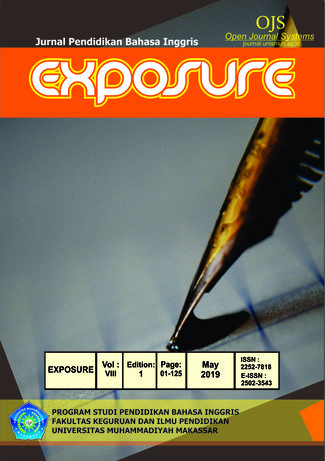ENGLISH YOUTUBE CHANNEL IN ENHANCING STUDENTS’ SPEAKING SKILL
DOI: https://doi.org/10.26618/exposure.v8i1.1994
YouTube English Channel, Speaking skill, Analytical exposition text
Abstract
This study was aimed at whether YouTube English Channel can significantly enhance the students’ speaking skill at the second semester students of Management Study Program of Economic Faculty in the academic year 2018/2019, University of Baturaja.Quasi experimetal method was used in this study. This study employed second semester students of Management Study Program of Economic Faculty, University of Baturaja with the total number of the population was 132 students. The sample of the study was 64 students and it was found that the value of Sig.= 0,000 less than the significance level (α=0,05) so it meant that there was a great correlation between the score of pre-test and post-test. Then, the value of t-obtained = 9,057 which means more than value of t-table = 2,042 with df = 32, and the value of sig.(2 tailed) = 0,000 less than the significance level (α=0,05). It can be concluded that there was a significant difference in speaking skill before and after treatment. It was believed that YouTube English Channel could enhance students’ speaking skill.
References
Berk, R. A. (2009). Multimedia teaching with video clips: TV, movies YouTube, and mtvU in the college classroom. International Journal of Technology in Teaching and Learning 5 (1) 1-21.
Brown, H.D. (2007). Principle of language learning and teaching. (5thed.). San
Fransisco: Longman.
Harmer, J.( 2007 ). How to teach English. London: Longman.
Hussain, I & Muhammad. (2008). Role of information technologies in teaching learning process: Perception of the faculty. The Turkish Online Journal of Distance Education
Jalaluddin, M. (2016). Using YouTube to enhance speaking skills in ESL
classroom. English for Specific Purposes World, 50(17). doi:
5296/ijl.v5i4.2930.
Khalid, A. (2012). The use of YouTube in teaching English literature: The case of Al-Majma’ah community college, Al-Majma’ah University (Case Study). International Journal of Linguistics, 4(4). doi: 10.5296/ijl.v5i4.2930.
Khan, J. (2013). Information technology. Retrieved from http://www.byte- notes.com/information-technology-definition-and-examples.
Muna, M.S. (2011). Utilizing YouTube video to enhance students’ speaking skill.
Retrived from htttp://perpustakaan.uns.ac.id.
Richard. J.C. (2008). Teaching listening and speaking theory to practice.
Cambridge: Cambridge University.
Somjai, S. M., & Janse, H. (2015). The use of debate technique to develop speaking
ability of grade ten students at bodindecha (sing singhaseni). International
Journal of Technical Research and Application, 4(4).
Thornbury, S. (2008). How to teach speaking. Harlow: Pearson Education.
Wahidi, R. (2009). Text form and features. Retrieved from http://jom.unri.ac.id/index.php/JOMFKIP/article/view/6147/5847
Downloads
Published
How to Cite
Issue
Section
License
Authors who publish with this journal agree to the following terms:
In order to assure the highest standards for published articles, a peer review policy is applied. In pursue of the compliance with academic standards, all parties involved in the publishing process (the authors, the editors and the editorial board and the reviewers) agree to meet the responsibilities stated below in accordance to the Journal publication ethics and malpractice statement.
Duties of Authors:
- The author(s) warrant that the submitted article is an original work, which has not been previously published, and that they have obtained an agreement from any co-author(s) prior to the manuscript’s submission;
- The author(s) should not submit articles describing essentially the same research to more than one journal;
- The authors(s) make certain that the manuscript meets the terms of the Manuscript Submission Guideline regarding appropriate academic citation and that no copyright infringement occurs;
- The authors(s) should inform the editors about any conflict of interests and report any errors they subsequently, discover in their manuscript.
Duties of Editors and the Editorial Board:
- The editors, together with the editorial board, are responsible for deciding upon the publication or rejection of the submitted manuscripts based only on their originality, significance, and relevance to the domains of the journal;
- The editors evaluate the manuscripts compliance with academic criteria, the domains of the journal and the guidelines;
- The editors must at all times respect the confidentiality of any information pertaining to the submitted manuscripts;
- The editors assign the review of each manuscript to two reviewers chosen according to their domains of expertise. The editors must take into account any conflict of interest reported by the authors and the reviewers.
- The editors must ensure that the comments and recommendations of the reviewers are sent to the author(s) in due time and that the manuscripts are returned to the editors, who take the final decision to publish them or not.
Authors are permitted and encouraged to post online a pre-publication manuscript (but not the Publisher’s final formatted PDF version of the Work) in institutional repositories or on their Websites prior to and during the submission process, as it can lead to productive exchanges, as well as earlier and greater citation of published work (see The Effect of Open Access). Any such posting made before acceptance and publication of the Work shall be updated upon publication to include a reference to the Publisher-assigned DOI (Digital Object Identifier) and a link to the online abstract for the final published Work in the Journal.














